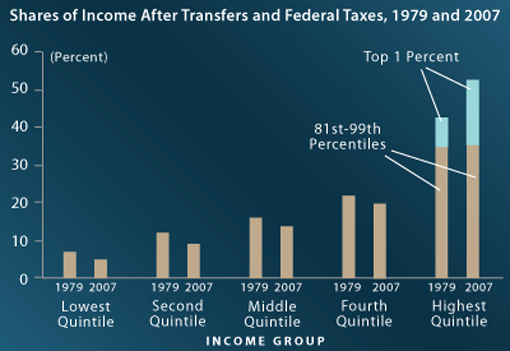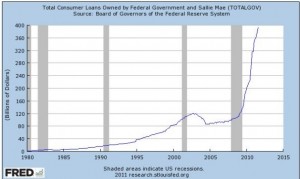Paul Krugman has a column and a blog post that ought to be read together. Both are about the way deficit hawkism are prolonging and worsening the recession, here and in Europe.
In “The Austerity Debacle” he writes that Britain climbed out of the Great Depression a lot faster than it is climbing out of the Great Recession. Same thing for Italy, Spain, and a lot of other European countries. And the reason they are having such a hard time is that today’s leaders threw the lessons of the past, including the lessons of the Great Depression out the window.
Britain, in particular, was supposed to be a showcase for “expansionary austerity,†the notion that instead of increasing government spending to fight recessions, you should slash spending instead — and that this would lead to faster economic growth.
This austerity was supposed to foster confidence, which was all that was needed.
Such invocations of the confidence fairy were never plausible; researchers at the International Monetary Fund and elsewhere quickly debunked the supposed evidence that spending cuts create jobs. Yet influential people on both sides of the Atlantic heaped praise on the prophets of austerity, Mr. Cameron in particular, because the doctrine of expansionary austerity dovetailed with their ideological agendas.
Thus in October 2010 David Broder, who virtually embodied conventional wisdom, praised Mr. Cameron for his boldness, and in particular for “brushing aside the warnings of economists that the sudden, severe medicine could cut short Britain’s economic recovery and throw the nation back into recession.†He then called on President Obama to “do a Cameron†and pursue “a radical rollback of the welfare state now.â€
Strange to say, however, those warnings from economists proved all too accurate. And we’re quite fortunate that Mr. Obama did not, in fact, do a Cameron.
My question is, why are beltway pundits so stupid? Do they start out that way, or is there something about Foggy Bottom that kills their brain cells?
Of course, many of ’em, and the politicians too, really just want to get rid of “entitlement” programs, and the Great Recession gave them an excuse.
The blog post “Destructive Austerity USA,” shows how budget cuts to state and local governments have been hurting the economy.
It’s hard to overstate just how wrong all this is. We have a situation in which resources are sitting idle looking for uses — massive unemployment of workers, especially construction workers, capital so bereft of good investment opportunities that it’s available to the federal government at negative real interest rates. Never mind multipliers and all that (although they exist too); this is a time when government investment should be pushed very hard. Instead, it’s being slashed.
What an utter disaster.
But, you know what they say — it’s all President Obama’s fault. “They” are idiots, of course.
Update: The utterly pathetic libertarian drones at Cafe Hayek have no argument to refute what Krugman says, so they just lie:
In his New York Times column today, Paul Krugman blames Britain’s economic woes on the British government’s alleged policy of “austerity.†Yet he offers no evidence that Her Majesty’s government is actually pursuing such a policy.
Here you go, pinheads:
U.K. Government Unveils Tough Austerity Plan : NPR (October 20, 2010)
UK Government Introduces Hardline Austerity Plan (October 20, 2010)
Pain of British Fiscal Cuts Could Inform U.S. Debate (April 14, 2011)
In the United States, the debate over how to cut the long-term budget deficit is just getting under way.
But in Britain, one year into its own controversial austerity program to plug a gaping fiscal hole, the future is now. And for the moment, the early returns are less than promising.
Retail sales plunged 3.5 percent in March, the sharpest monthly downturn in Britain in 15 years. And a new report by the Center for Economic and Business Research, an independent research group based here, forecasts that real household income will fall by 2 percent this year. That would make Britain’s income squeeze the worst for two consecutive years since the 1930s.
All of which has challenged the view of Britain’s top economic official, George Osborne, that during a time of high deficits and economic weakness, the best approach is to aggressively attack the deficit first, through rapid-fire cuts aimed at the heart of Britain’s welfare state.
George Osborne will stick to austerity programme despite halting output (July 23, 2011)
Osborne’s austerity program hits the rails (November 29, 2011)
His austerity plans cut far and fast. Osborne was told this would increase unemployment and it has. Increased joblessness has led to pronounced consumer pessimism. Shops are closing, putting more people out of work. Paying several hundred thousand more people unemployment benefits is driving up debt.
UK Sticking To Austerity Plan Despite GDP Drop – NASDAQ.com (5 days ago)
Cafe Hayek’s argument that Britain hasn’t really been engaged in an austerity program is that its budget deficit is still high and has gone higher. That’s because the bleeping austerity program isn’t working, you morons. More people out of work means two things:
1. Lower tax revenue
2. Higher spending
Duh. Of course, the crew at Hayek probably thinks the out-of-work Brits ought to just be allowed to drop dead in the streets, or should start eating babies.


